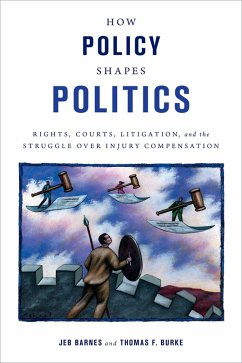Judicialization, juridification, legalization-whatever terms they use, scholars, commentators and citizens are fascinated by what one book has called "The Global Rise of Judicial Power" and seek to understand its implications for politics and society. In How Policy Shapes Politics, Jeb Barnes and Thomas F. Burke find that the turn to courts, litigation, and legal rights can have powerful political consequences. Barnes and Burke analyze the field of injury compensation in the United States, in which judicialized policies operate side-by-side with bureaucratized social insurance programs. They conclude that litigation, by dividing social interests into victims and villains, winners and losers, generates a fractious, chaotic politics in which even seeming allies-business and professional groups on one side, injured victims on the other-can become divided amongst themselves. By contrast, social insurance programs that compensate for injury bring social interests together, narrowing the scope of conflict and over time producing a more technocratic politics. Policy does, in fact, create politics. But only by comparing the political trajectories of different types of policies -- some more court-centered, others less so -- can we understand the consequences of arguably one of the most significant developments in post-World War II government, the increasingly prominent role of courts, litigation, and legal rights in politics.
Dieser Download kann aus rechtlichen Gründen nur mit Rechnungsadresse in A, B, BG, CY, CZ, D, DK, EW, E, FIN, F, GR, HR, H, IRL, I, LT, L, LR, M, NL, PL, P, R, S, SLO, SK ausgeliefert werden.


